Based on values entered for course scores, Campus automatically calculates a student's grade point average. This GPA is available in several locations—Report Cards, Transcripts, and several grading reports, for example. This article describes each type of GPA calculation. See the tools available in Grading and Standards for more information.
GPA Decimal Placement
The number of decimal places to which GPAs are reported is set in the System Preferences tool in the Number of Significant GPA Decimal Places field. Up to five decimal places can be selected. Standard rounding rules apply.
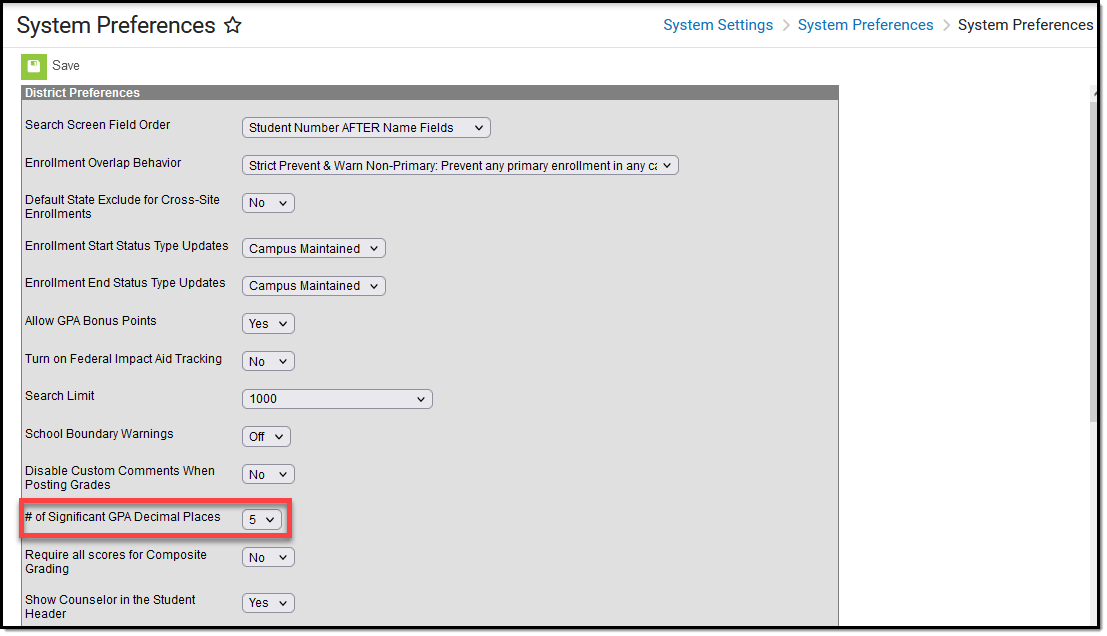 System Preferences- Number of Significant GPA Decimal Places
System Preferences- Number of Significant GPA Decimal Places GPA Options
Different GPA types are available for calculating a student's grade point average. Note that the GPA Calculation uses only posted scores in the calculation; in-progress grades are NOT included.
GPA Type |
Definition |
Use |
|---|---|---|
Calculated using the student's scores within a specified term (e.g., quarter, semester, trimester).
The Term GPA on the Grades tool, Report Card, Term GPA Report, and in an Ad hoc filter uses courses that have a score in a grading task with a Term GPA (weight). |
| |
Calculated using all grades posted to the student's transcript.
|
| |
Calculated using the student's current year grading tasks marked as Post to Transcript (Term GPA) and historical posted grades (Cumulative GPA).
|
| |
| Yearly GPA | Calculated using all grades posted to the student's transcript within a designated school year. Bonus Points are not included. |
|
| Grade Calculation Snapshot | Calculates and provides snapshots of each student's most current GPA and class rank three times a year (January 30, June 30, and September 15). Data is available using Ad hoc Reporting. See the GPA Information in Ad hoc section below for more information. State Edition: Data syncs from the district level to the state level. | |
A course is not included in these calculations when there is no GPA value, a blank or null GPA Weight, or the student's grade level is marked as Exclude from GPA/Class Rank. When a course has only an unweighted GPA Value, the Value is included in a Weighted GPA calculation and vice versa.
GPA Values
GPA Values are grade points/GPA points assigned to a score. GPA values are set in the GPA Value field of a Score Group/Rubric applying to the course. The GPA Value field is considered the "weighted" field. This applies to cumulative GPAs as well.
When grade points in a certain score group/rubric should be valued higher than others, the score group/rubric needs to use different values in the weighted GPA Value field and the Unweighted GPA Value field.
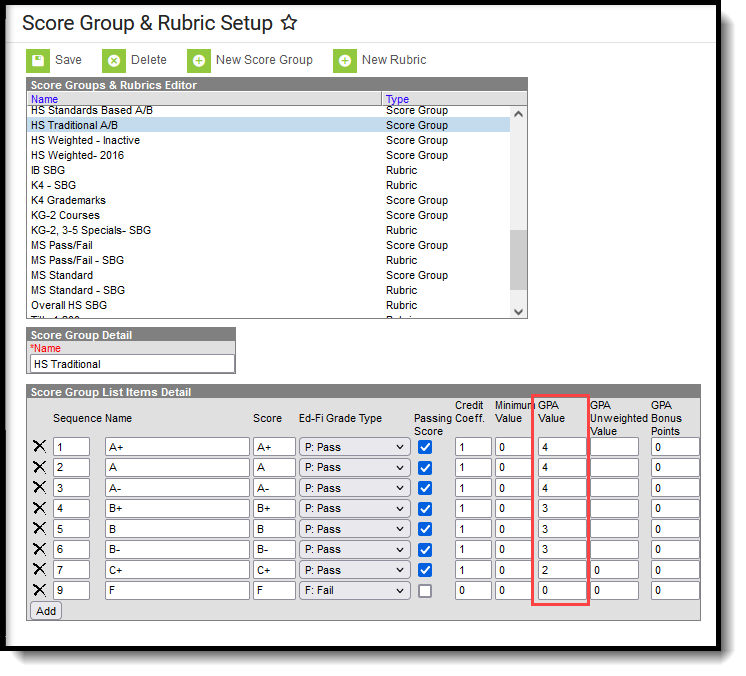 GPA Value in Score Groups
GPA Value in Score Groups
GPA values might look like this in a score group, as noted in the image above:
- Each A that a student receives is 4 GPA points.
- Each B that a student receives is 3 GPA points.
- Each F that a student receives is 0 GPA points.
A score can have both a GPA Value and an Unweighted GPA Value; they would be the same when the score group is not used to give scores from some courses a higher value.
Assign GPA Values for Regular Scores
When the course does not require special GPA value weighting, the value entered in the GPA value field should be the same as in the Unweighted GPA Value field.
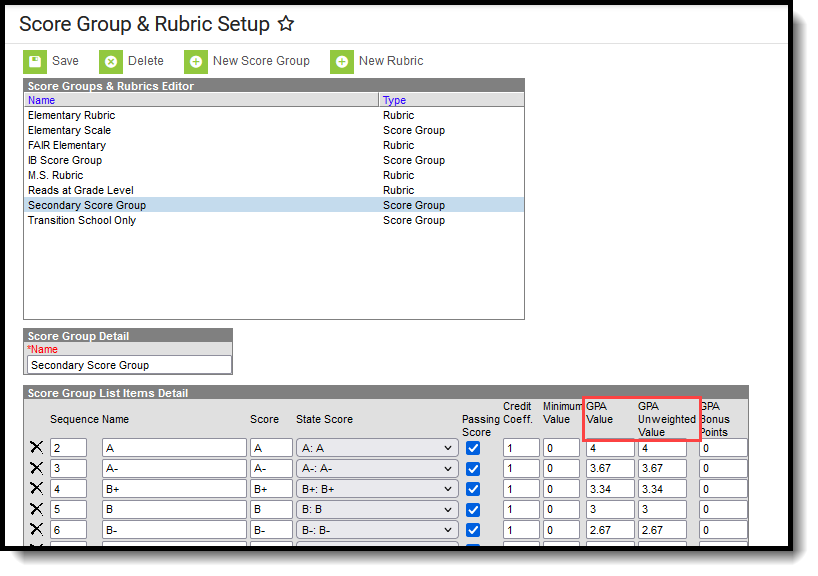 GPA Value and Unweighted Value are the Same Values
GPA Value and Unweighted Value are the Same Values
Assign GPA Values for Weighted Scores
In a scenario where a score in a course should “weigh” more than scores in other courses, the GPA Value field should be set slightly higher than the regular value to reward students for attempting more challenging material (e.g., earning an “A” in AP Calculus may need to count for 5 grade points, compared to an “A” in standard math, which should only count for 4 grade points).
In such a scenario, the Unweighted GPA Value field indicates the standard (unweighted) value to be used when an unweighted GPA is needed. The GPA Value field should indicate the weighted value (higher than the unweighted value).
 GPA Value and Unweighted Value are Different Values
GPA Value and Unweighted Value are Different Values
The value entered in the Unweighted GPA Value field is used toward GPA calculations when an unweighted GPA displays on a report card or transcript, and the value entered in the (weighted) GPA Value field is used toward GPA calculations when a weighted GPA displays. When there is only one type of GPA value, it is used in both unweighted and weighted calculations.
Weighted vs. Unweighted Example
Using the standard calculation, when a student has five As and the GPA value and the Unweighted GPA value for an A both equal 4:
SUM (GPA Value for A * GPA Weight for A) |
(4x1) + (4x1) + (4x1) + (4x1) + (4x1) = 20 |
SUM of GPA Weights for A |
1 + 1 + 1 + 1 +1 = 5 |
Calculate GPA |
20/5 = 4.0 GPA |
When the same scenario exists, except that one course has a GPA value of 5 and an Unweighted GPA value of 4, note the difference in GPA:
SUM (GPA Value for A * GPA Weight for A) |
(4x1) + (4x1) + (4x1) + (4x1) + (5x1) = 21 |
SUM of GPA Weights for A |
1 + 1 + 1 + 1 +1 = 5 |
Calculate GPA |
21/5 = 4.2 GPA |
Term GPA Weight
Term GPA Weight is set on Course Grading Tasks in the Term GPA field. The value entered in this field designates how heavily a grading task counts towards a student's Term GPA.
The Term GPA weight should only be set on one grading task per course. It should not be set on multiple grading tasks for the same course, or it averages multiple grades for a single term. The Term GPA field should only be set on a term grading task (e.g., quarter, trimester) and not be applied to mid-term or activity-related grading tasks.
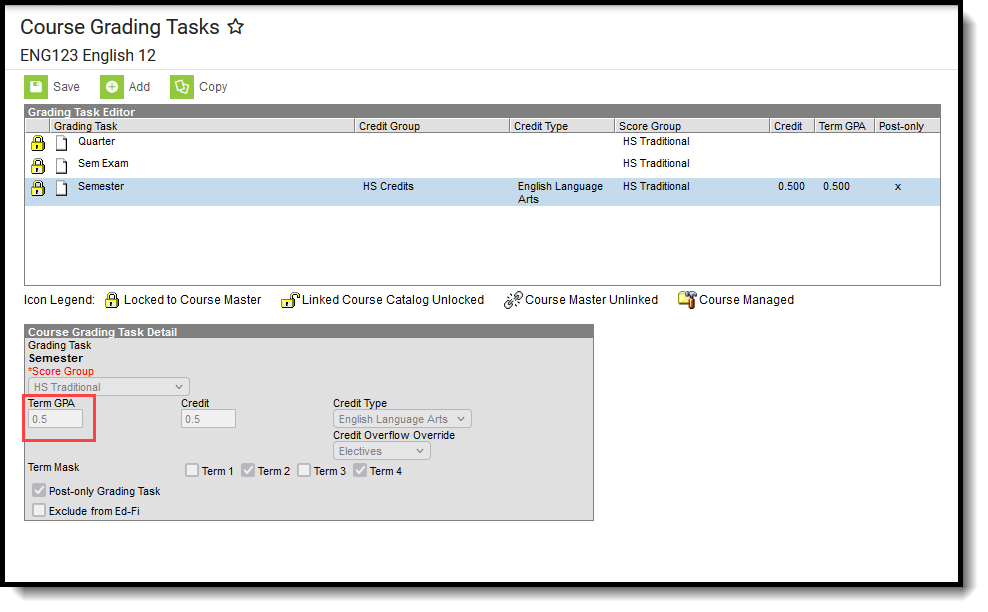 Term GPA on Course Grading Task
Term GPA on Course Grading Task
The Term GPA field should be left blank when the grading task should not count toward a student's term GPA. A zero (0) value should NOT be entered, or calculations may be inaccurate. Though the value in the Term GPA field can be set as desired, the value is most often set to 1 for standard courses that meet regularly during the term. When a course meets half as often as a standard course (every other day), it might be given a value of .5.
In a four-quarter/two-semester setup that reports quarterly honor rolls, the Quarter Grading Task has a value set in the Term GPA field. The Semester Grading Task does not have this field populated.
Cumulative GPA Weight
A GPA weight is assigned to a course's GPA Weight field. It is used as a multiplier to determine how heavily a course score should affect a student's cumulative GPA.
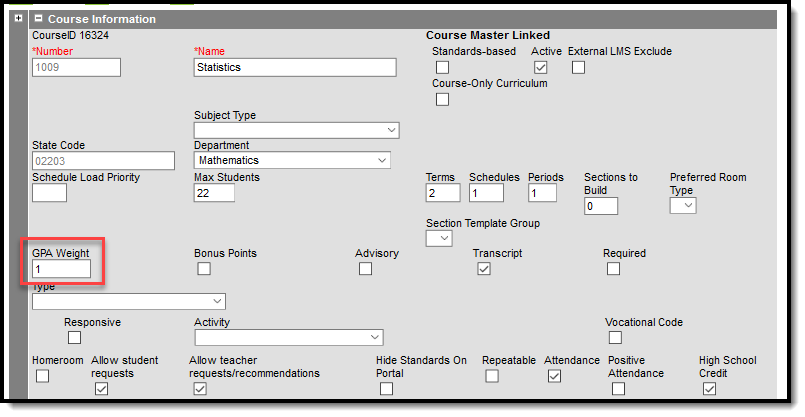 Course GPA Weight
Course GPA Weight
The value entered in the GPA Weight field indicates the impact a course score has compared to other courses. In a standard 4.0 score group, where an A gets 4 grade points, a course with a GPA weight value of 2 (4x2 = 8) impacts more than a course with a GPA weight value of 1 (4x1 = 4).
Most courses receive a value of 1. Non-academic or extracurricular courses that do not affect a student's cumulative GPA should not receive any weight (GPA Weight field value is set to zero).
When the GPA Weight on a Transcript Course Record is blank/null or zero, the GPA Value for that Course is not included in any GPA or Unweighted GPA calculations on the transcript.
GPA Calculations
Term GPA Calculation
Term GPA can be used to determine student eligibility for term honor rolls and dean's list participation. A student's Term GPA is based upon two components:
- The Term GPA (weight) defined for the Grading Task
- The GPA Value defined for the score received.
The formula for calculating a student's Term GPA in Campus is:
- The GPA value for a score is multiplied by the coordinating Term GPA weight for the Grading Task. This is done for each score within the specified term.
- All values from Step 1 are added together.
- The resulting value is divided by the total Term GPA weights for all scores within the specified term.
 Term GPA Calculation
Term GPA Calculation
Cumulative GPA Calculation
A student's Cumulative GPA is the GPA displayed on transcripts and report cards. This is the most current average of a student's GPA history. It is often considered the most official form of GPA, as it only includes scores posted to a student's transcript.
The calculation for Cumulative GPA is the same as for Term GPA, except the GPA weights are derived from a different location. The grading tasks may also differ.
The basic formula for calculating a student's Cumulative GPA in Campus is:
- The GPA value for a score is multiplied by the coordinating GPA weight for the score.
- All values from Step 1 are added together.
- The resulting value is divided by the total GPA weights for all scores.
 Cumulative GPA Calculation
Cumulative GPA Calculation
Rolling Cumulative GPA Calculation
The Rolling Cumulative GPA predicts a student's next Cumulative GPA. It can be seen on the student's grades tool and may be used to predict a student's class rank and/or likelihood of graduation.
Rolling Cumulative GPA is a combination of all student scores posted to their transcript (Cumulative GPA) from previous years’ terms and the Term GPA, derived from the grading tasks set to calculate Term GPA posted during the current year.
Rolling Cumulative GPA is an estimate and should be used for projection purposes only unless a district does not post to transcripts until the end of the school year. Rolling Cumulative GPAs may be used to determine projected Class Rank.
- A student's existing Cumulative GPA is multiplied by the existing Cumulative GPA Weight for all existing scores. This is the Cumulative GPA and GPA Weight for all scores posted to the transcript from previous years (excluding those posted to the current year).
- The Term GPA is multiplied by the Term GPA Weight. These elements are taken from the term scores existing for the current school year.
- The Cumulative GPA Weight and the Term GPA Weight are added together.
- The Values from Step 1 and Step 2 are added together.
- The result is divided by the value from Step 3. The final number is the student's Rolling Cumulative GPA.
 Rolling Cumulative GPA Calculation
Rolling Cumulative GPA Calculation
The Cumulative GPA portion is based on transcript data for all years prior to the current school year, and the Rolling Term GPA portion is based on the Term GPA earned that particular term. Rolling Cumulative GPA is not displayed on the Grades tool when the district uses Custom GPA Calculations.
Yearly GPA Calculation
The calculation for Yearly GPA is similar to that of the Cumulative GPA, except the GPA Value is derived using Transcript Course records with the same 'endYear' value.
The basic formula for calculating a student's Yearly GPA in Campus is:
- The GPA value for a score is multiplied by the coordinating GPA weight for the score.
- All values from Step 1 are added together.
- The resulting value is divided by the total GPA weights for all scores.
If the Transcript Course GPA Weight value is '0' or null, the Transcript Course Record is not included in the GPA calculation.
 Yearly GPA Calculation
Yearly GPA Calculation
Bonus Points
Bonus points can be applied to GPAs to reward students. These points are awarded at a particular course's score/mark level. Students receive bonus points based on the score earned (e.g., an “A” may receive a bonus point, whereas a “C” may not).
Incorporating bonus point values is different from changing a course’s GPA weight. Adjusting a course’s GPA weight can positively or negatively affect student GPAs. Bonus points are strictly advantageous and only positively affect a student’s GPA.
Correctly setting up the Campus application to incorporate bonus points is a four-step process:
- System Preferences - set the Allow GPA Bonus Points preference to Yes.
- Mark the Bonus Points checkbox on the Course.
- Set the value of Bonus Points on the Score Group/Rubric associated with the course.
- Report Preferences - When a Transcript/Report Card is created, choose the GPA Display option of either GPA with Bonus Points (transcript), Unweighted GPA with Bonus Points (transcript), Cumulative GPA - with Bonus Points (report card) or Term GPA - with Bonus Points (report card).
Adjusted GPA Calculations for Bonus Points
Bonus points are added to GPA calculations as necessary. The Term GPA, Cumulative GPA, and Rolling Cumulative are calculated as follows when bonus points are used:
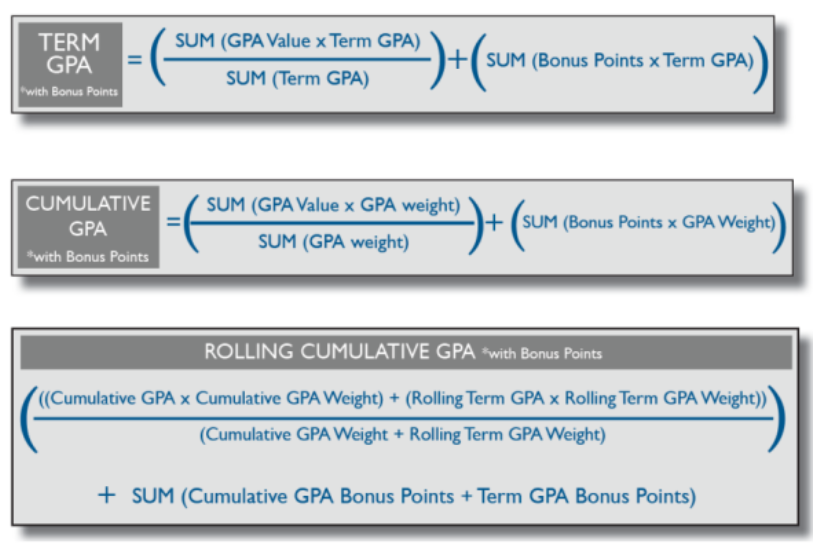 Bonus Point Calculation
Bonus Point Calculation
Class Rank
Class Rank measures a student's performance compared to other students in their class and is calculated using scores posted to the student's Transcript record. Class Rank displays on the student's Credit Summary (see image below), prints on the Transcript, eTranscript, Report Card (when Class Rank preferences have been selected), and the Class Rank Report.
Some states may have localized calculations the affect the GPA and Class Rank for students. See your state's information for guidance on localized calculations.
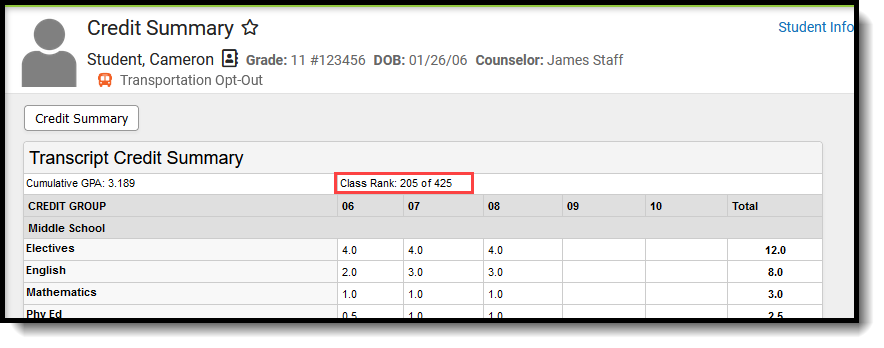 Credit Summary Class Rank Display
Credit Summary Class Rank Display
The stored procedures that calculate GPA include logic determining whether a student has class rank calculated for them. It is based on the Include Class Rank field on the Enrollment End Status Setup tool or the State Enrollment End Status value.
Students are EXCLUDED from class rank calculations when:
- Class Rank Exclude is marked on their enrollment record; OR
- Their enrollment record has ended (end date, end status fields populated), UNLESS:
- The Class Rank Include checkbox on the Enrollment End Status Type that is linked to the enrollment is marked;
- The Enrollment End State Code (State End Status) Code Value is 1.
For BIE schools, the logic is slightly different. See the Click here to expand the section below.
The Value of the Enrollment End Status is set in the Attribute Dictionary and cannot be modified.
GPA Information in Ad hoc
The following options are available when creating Student Data Type filters using the Filter Designer.
| GPA Option | Location |
|---|---|
| Term GPA | Grading > Term GPA
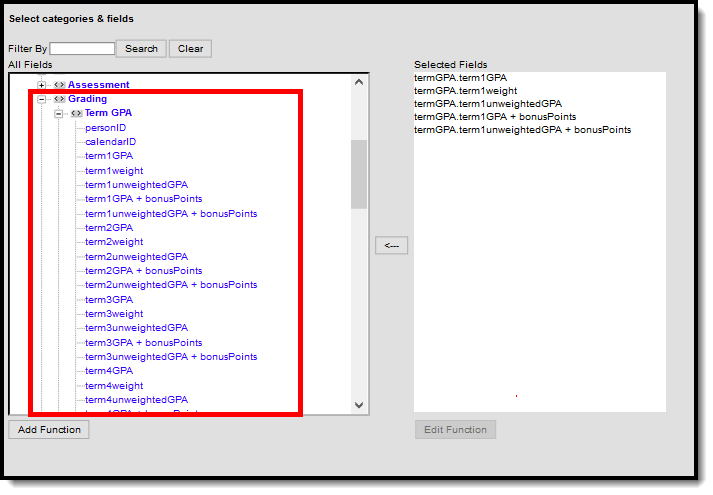
|
| Compound Term GPA | Grading > Term GPA > Compound Term GPA
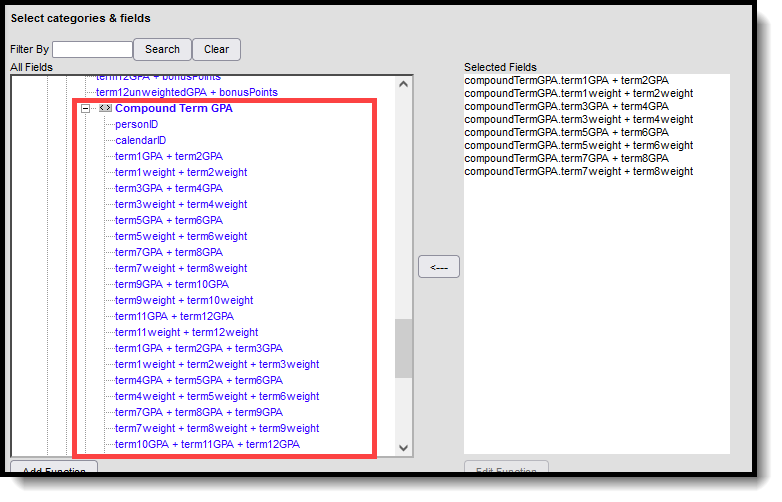 |
| Compound Term GPA Bonus | Grading > Term GPA > Compound Term GPA Bonus
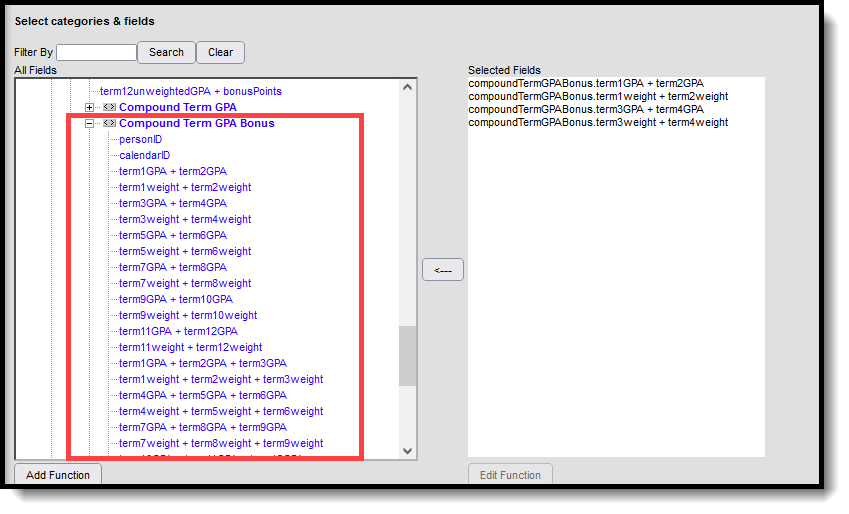
|
| Compound Term GPA Unweighted | Grading > Term GPA > Compound Term GPA Unweighted 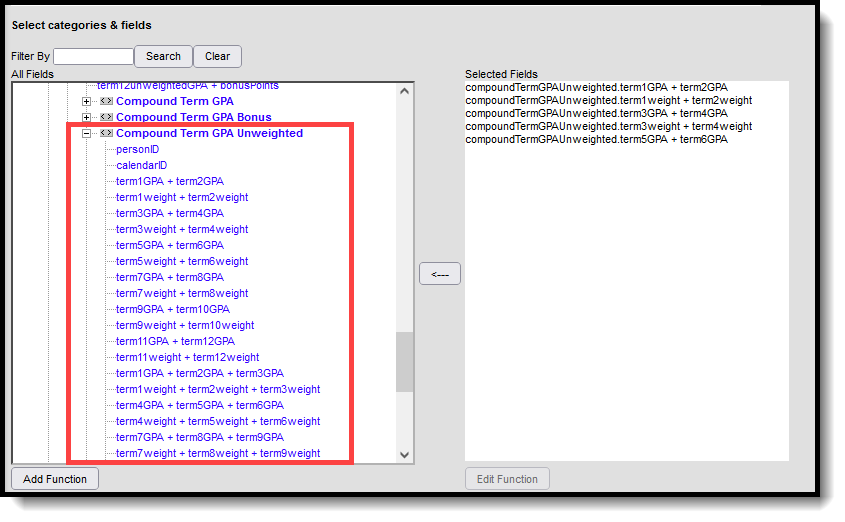 |
| Compound Term GPA Unweighted Bonus | Grading > Term GPA > Compound Term GPA Unweighted Bonus
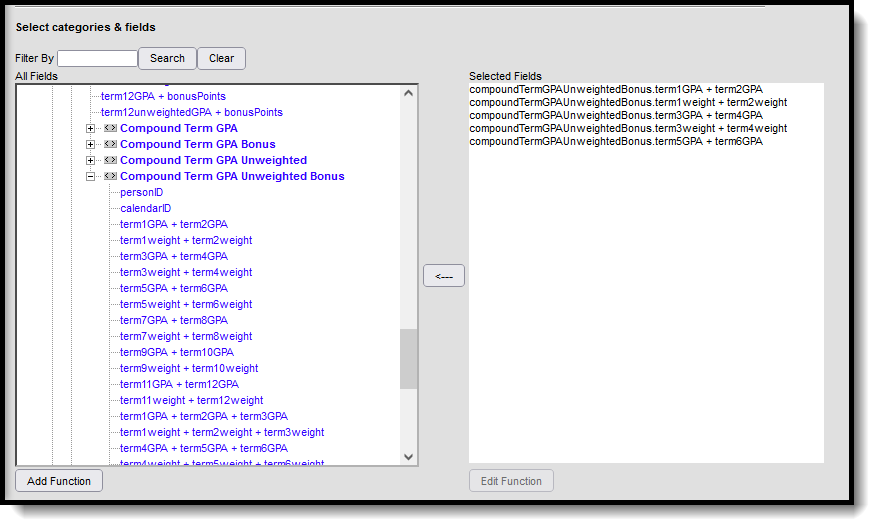 |
Cumulative GPA
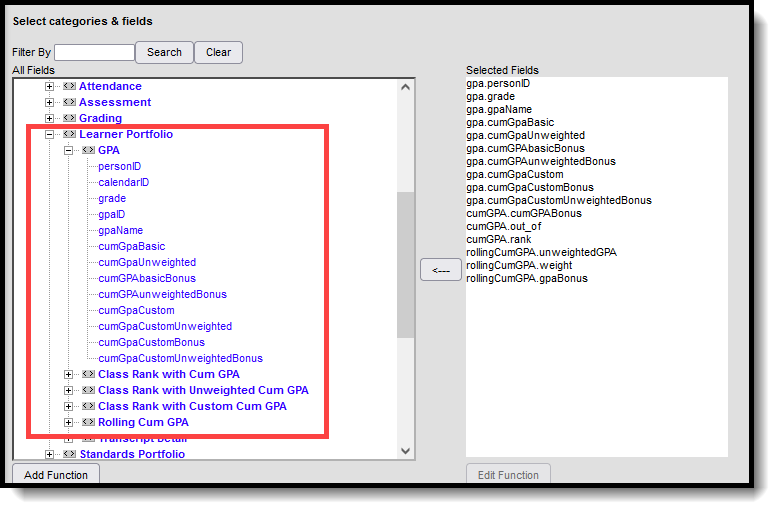 Cumulative GPA Ad hoc Fields
Cumulative GPA Ad hoc Fields
Use the following cumulative GPA options to report a student's cumulative GPA when building Student Data filters:
Query Wizard Path |
Fields |
|---|---|
| Student > Learner Portfolio > GPA | gpa.gpaID gpa.gpaName gpa.cumGpaBasic gpa.cumGPAUnweighted gpa.cumGPAbasicBonus gpa.cumGPAunweightedBonus gpa.cumGPACustom gpa.cumGPACustomUnweighted gpa.cumGPACustomBonus gpa.cumGPACustomUnweightedBonus |
| Student > Learner Portfolio > Class Rank with Cum GPA | cumGPA.cumGPA cumGPA.cumGPABonus cumGPA.rank cumGPA.out_of |
| Student > Learner Portfolio > Class Rank with Unweighted Cum GPA | unweightedGPA.cumGPA unweightedGPA.cumGPAunweightedBonus unweightedGPA.rank unweightedGPA.out_of |
| Student > Learner Portfolio > Class Rank with Custom Cum GPA | customGPA.gpaID customGPA.gpaName customGPA.cumGPA customGPA.rank customGPA.out_of customGPA.cumGPAbonus customGPA.rankBonus customGPA.out_ofBonus customGPA.cumGPAunweighted customGPA.cumGPArankUnweighted customGPA.cumGPAunweightedBonus customGPA.rankUnweightedBonus customGPA.out_ofUnweightedBonus |
| Student > Learner Portfolio > Rolling Cum GPA | rollingCumGPA.gpa rollingCumGPA.unweightedGPA rollingCumGPA.weight rollingCumGPA.gpaBonus rollingCumGPA.unweightedGPABonus rollingCumGPA.bonusPoints |
When a GPA is not labeled as Unweighted, the calculation uses the Weighted GPA values, which could be referenced as cumGPABasic, cumGPACustom, cumGPA, or GPA.
Yearly GPA - District Edition
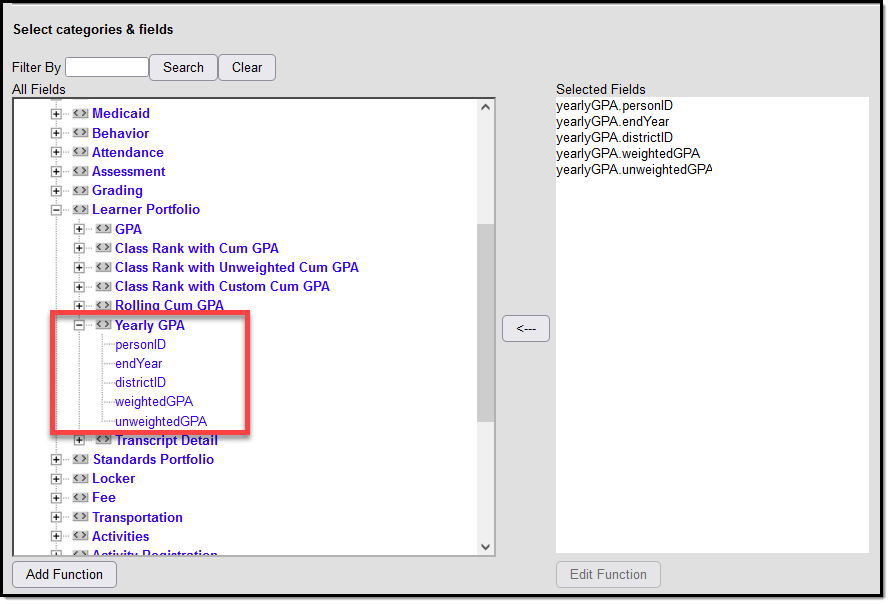
Use the following options to report a student's Yearly GPA when building Student Data filters:
Query Wizard Path (District Edition) |
Fields |
|---|---|
| District Edition Path Student > Learner Portfolio > Yearly GPA |
yearlyGPA.personID yearlyGPA.endYear yearlyGPA.districtID yearlyGPA.weightedGPA yeralyGPA.unweightedGPA |
Yearly GPA - State Edition
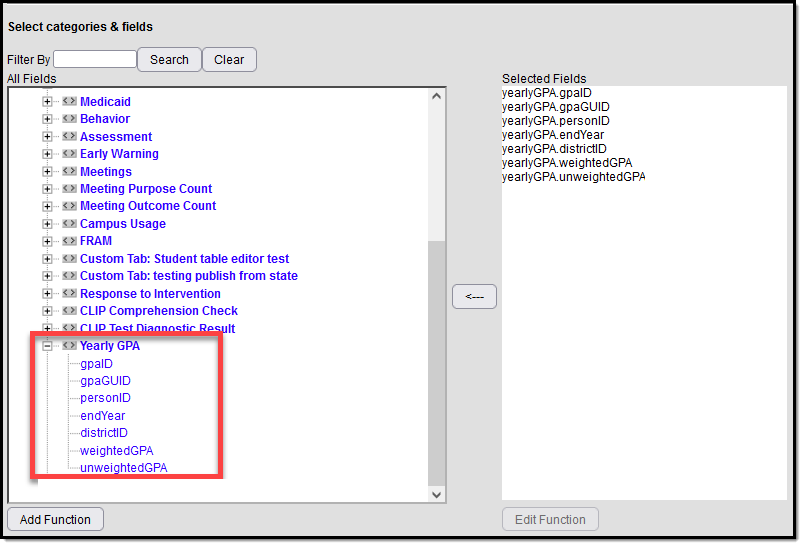
Use the following options to report a student's Yearly GPA when building Student Data filters:
Query Wizard Path (State Edition) |
Fields |
|---|---|
| Student > Yearly GPA
|
yearlyGPA.gpaID yearlyGPA.gpaGUID yearlyGPA.personID yearlyGPA.endYear yearlyGPA.districtID yearlyGPA.weightedGPA yeralyGPA.unweightedGPA |
Grade Calculation Snapshot - District Edition

Query Wizard Path (District Edition) | Fields |
|---|---|
| District Edition Path Student > Learner Portfolio > Grade Calculation Snapshot | gcs.gradeCalculationSnapshotID gcs.gradeCalculationSnapshotGUID gcs.personID gcs.calendarID gcs.grade gcs.timestamp gcs.unweightedGPA gcs.weightedGPA gcs.rank |
Grade Calculation Snapshot - State Edition

Use the following options to report a Grade Calculation Snapshot when building Student Data filters:
Query Wizard Path (State Edition) | Fields |
|---|---|
| State Edition Path Student > Grade Calculation Snapshot | gcs.gradeCalculationSnapshotID gcs.gradeCalculationSnapshotGUID gcs.personID gcs.calendarID gcs.grade gcs.timestamp gcs.unweightedGPA gcs.weightedGPA gcs.rank |
State-Specific Information
Follow these links to view GPA information for your state. Linked articles open in a new browser tab.
